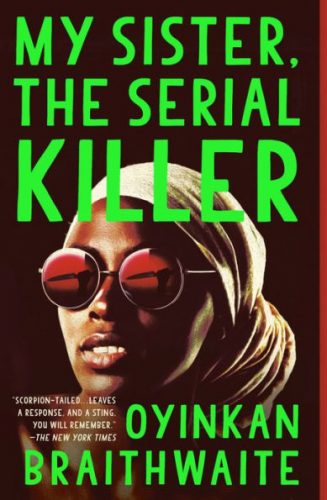
What would you do to protect your sister?
Would you be prepared to lie? If so, who to? The rest of your family? The police? How about the family of the boyfriend they killed? And is there anything that might make you reconsider those lies? Korede is about to find out…
What’s it about?
‘Perhaps a normal person would be angry, but what I feel now is a pressing need to dispose of the body.’
When Korede’s dinner is interrupted one night by a distress call from her sister, Ayoola, she knows what’s expected of her: bleach, rubber gloves, nerves of steel and a strong stomach. This’ll be the third boyfriend Ayoola’s dispatched in ‘self-defence’ and the third mess that her lethal little sibling has left Korede to clear away. She should probably go to the police for the good of the menfolk of Nigeria, but she loves her sister and, as they say, family always comes first. Until, that is, Ayoola starts dating the doctor where Korede works as a nurse. Korede’s long been in love with him, and isn’t prepared to see him wind up with a knife in his back: but to save one would mean sacrificing the other…
What’s it like?
Wonderfully brisk. How do you deal will a dead body? Well, this is Ayoola’s third victim, so although Korede was hoping ‘it’ wouldn’t happen again, she has by this stage developed a simple checklist for dealing with a dead body and has a stash of bleach ready to deploy. Chapters are very short and to the point, presenting the reader with mini-scenes of death and
I loved the instantly recognisable mixture of sisterly love and frustration. Ayoola offers to clean the blood from her long-suffering sibling’s car, but Korede takes pride in knowing that, ‘Ayoola could never clean up as efficiently as I can.’ While Ayoola describes how her relationship with body number three, Femi, had developed because she was moved by the love poetry he wrote her, Korede notes dismissively that ‘Ayoola is always moved by the worship of her merits’. Classic sisters: they are sharply aware of each other’s faults, but will always defend each other against outsiders. Or will they?
When Kordede imagines the deceased Femi asking her what he could have done differently, her response holds him accountable: ‘You could have seen her for what she was’.
Korede’s doubts, which can’t be fully supressed after having to handle three dead boyfriends, are literally bracketed ‘(But why was she carrying the knife?’) until she realises that the beautiful but deadly Ayoola is building a relationship with Tade. Capable nurse Korede already has a relationship with Tade, but any romantic element exists solely in her mind. Braithwaite’s story is genuinely fun in a murdery, pointy way, as we uncover Korede’s attempts to divert Ayoola, discredit her to Tade and generally avoid the impending disaster. Ultimately, as Ayoola points out, Korede is going to have to choose…
Final thoughts
This is a wonderfully wicked tale, but it also develops a surprising poignancy by the closing pages. Nigeria is just a background at first, but it gradually becomes an essential element of the tale Braithwaite has to tell.
Sharp, funny and a strong ending. I can’t wait to read more by Oyinkan Braithwaite.